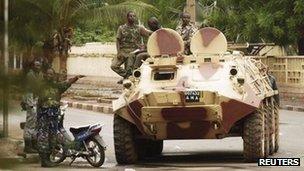Mali coup: Junta forces 'overrun rivals' camp'
- Published

Despite handing over power, Mali's coup leaders retain huge influence in the country
Pro-junta forces in Mali have taken control of the main anti-junta military base after two days of fighting in the capital, Bamako, witnesses say.
Junta forces are going through the camp looking for any remaining troops, a witness told the BBC.
The shooting broke out late on Monday after reports that the leaders of the presidential guard would be arrested.
The army toppled President Amadou Toumani Toure in March but officially stepped aside three weeks later.
However, the junta still wields considerable influence and holds three cabinet posts.
'Odious act'
The fighting has claimed at least 14 lives, Abdoulaye Nene Coulibaly, the director of Bamako's Gabriel Toure hospital, told AFP news agency.
Some 40 people have been wounded on both sides of the conflict, Mr Coulibaly said.
The fighting has also delayed the return home of <link> <caption>football teams from Egypt and Nigeria, who had been playing in Mali</caption> <url href="http://www.bbc.co.uk/sport/0/football/17910406" platform="highweb"/> </link> .
Witnesses say that most soldiers in central Bamako's Djicoroni camp had fled before the junta forces moved in. One told the Reuters news agency that he had seen three dead bodies there.
Early on Tuesday, coup leaders broadcast a message saying the situation was under control after clashes with members of the presidential guard and "foreign elements".
"Everyone involved, no matter to what extent, in this odious act against the Malian people will be tracked down and brought before the competent jurisdictions," the statement read.
Members of the "Red Berets" presidential guards unit earlier reportedly entered the broadcaster's building, which had been controlled by pro-junta forces since the coup.
"These are elements of the presidential guard from the old regime and they're trying to turn things around," junta spokesman Bacary Mariko told the Reuters news agency.
Bamako-based journalist Martin Vogl told the BBC that the airport and the junta's military base just outside the capital were also attacked.
He says that while the presidential guard was the section of the army which was least supportive of the coup, there is no sense that they are now trying to bring back former President Toure, who has fled to neighbouring Senegal.
One eyewitness told Reuters that the streets of Bamako were deserted. Electricity has been cut in several part of the city.
A spokesman for the regional body, Ecowas, told the BBC's Network Africa programme he was not surprised by the fighting because the junta was "still meddling" in the affairs of government.
"We urge [the military] to get back to barracks," said Sonny Ugoh.
He said there was "no alternative" to sending troops to Mali but stressed they were to help Mali fight rebels who have seized control of the three northern provinces of Timbuktu, Kidal and Gao - a mostly desert area the size of France.
The rebels are a combination of ethnic Tuareg separatists and Islamists, who want to impose Sharia law across the whole country.
The 22 March coup was led by soldiers who accused former President Toure of failing to combat the insurgency, which took advantage of the unrest to make rapid advances.
Martin Vogl says the coup leaders oppose Ecowas plans for interim President Dioncounda Traore to stay in power for a year while organising elections.
Despite officially handing over power on 12 April, the junta later went on to arrest a number of loyalists to the ousted president, prompting Mr Toure to escape to Senegal.